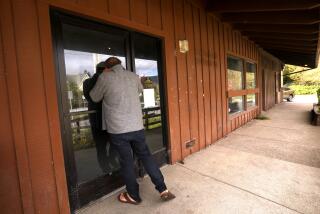Anti-Fraud Fixes Sought in Change-of-Address System
- Share via
WASHINGTON — Mary Zupanc, a physician at the Mayo Clinic in Rochester, Minn., did not realize that someone was tampering with her mail until last fall when she realized she was no longer receiving her monthly copy of the New England Journal of Medicine.
By that time, a Nigerian gang had diverted Zupanc’s correspondence to a Brooklyn address and forged her name on documents, raided her bank accounts and effectively destroyed her credit rating.
Since Zupanc’s story was broadcast two weeks ago by “60 Minutes,” the CBS-TV Channel 2 news program, senior U.S. Postal Service and mail-industry officials have agreed that the agency’s change-of-address system must be improved. The trouble is that, despite two weeks of internal discussions, postal officials have yet to decide what they can do to fix the problem.
“If crooks are going to target this mechanism, the mechanism itself is indefensible,” said postal consultant Michael F. Cavanagh, who has been pressing for changes. Cavanagh and other mailers say nothing less than the sanctity of the mail system is at stake.
What the “60 Minutes” account revealed was how anyone’s mailing address can be changed, even by a stranger. All it takes is a change-of-address postcard that is available at all 40,000 post offices.
In most cases, the Postal Service implements the change--42 million times a year--promptly without any independent verification that the information is accurate.
“It’s clear that they don’t have any controls,” said Robert S. Gellman, a privacy and information policy consultant in Washington who noted that the agency accepted Zupanc’s address change even though her name was misspelled on the postcard. “They know better. They’re simply unwilling to help their customers. They pay no attention to anything other than the bottom line.”
Postal spokesmen insisted Thursday that the agency is working on a solution, but it may take a month or more before a new policy can be devised.
“We believe the system we have is the envy of the world,” said Robert G. Krause, who manages address management for the Postal Service. “By and large, it works wonderfully well. The Zupanc case is one rare exception.”
Lawmakers from Minnesota have demanded that the agency change the policy or face congressional action.
“Convenience has taken the place of common sense,” said Rep. Bruce F. Vento (D-Minn.), in a letter to Postmaster General Marvin T. Runyon. Both Vento and Rep. James L. Oberstar (D-Minn.) argued that photo identification should be required before a change of address can be accepted by the Postal Service.
But Krause said that would not work. “We don’t believe that would act as any kind of deterrent,” he said, noting that the gangs involved in such crimes probably have access “to multiple fake IDs.”
Sending confirmation letters to the old address would be another problem. That, Krause said, would cost $12 million a year and most people don’t bother to give the Postal Service their new address until a day before they move. Since November, the agency has sent confirmation letters to the new address, a step that would play into the hands of the gang that was diverting Zupanc’s mail.
Other postal officials noted that many customers, such as elderly individuals moving into nursing homes, cannot physically come to a post office to present identification. Postal spokeswoman Sandra Harding said the agency believes about 1,000 addresses a year are fraudulently changed. That is a relatively small percentage of the 24 million addresses changed each year, she said. “But if you are one of those affected, this is a serious problem.”
Changes of address long have been regarded as a costly problem by Postal Service officials. The agency recently paid $50 million to a San Diego inventor who had created a change-of-address machine that the agency briefly used before declaring the machine unworkable. Since then it has been planning to accept changes of address in computerized electronic kiosks that are going to be set up in postal lobbies. But the new change-of-address problems may threaten that.
Mailers said their anxiety over fraudulent addresses has been heightened by new rules that require that they use address lists approved by postal officials to qualify for bulk-mail discounts. Their worry is one of liability, if a bad address they have been given by the Postal Service creates another Zupanc case, one mailer said.
Cavanagh, who represents financial institutions, said he was confident that the agency would resolve the problem. “The Postal Service hadn’t fully understood the dimensions of the problem, but they do now,” he said.
More to Read
Sign up for Essential California
The most important California stories and recommendations in your inbox every morning.
You may occasionally receive promotional content from the Los Angeles Times.













